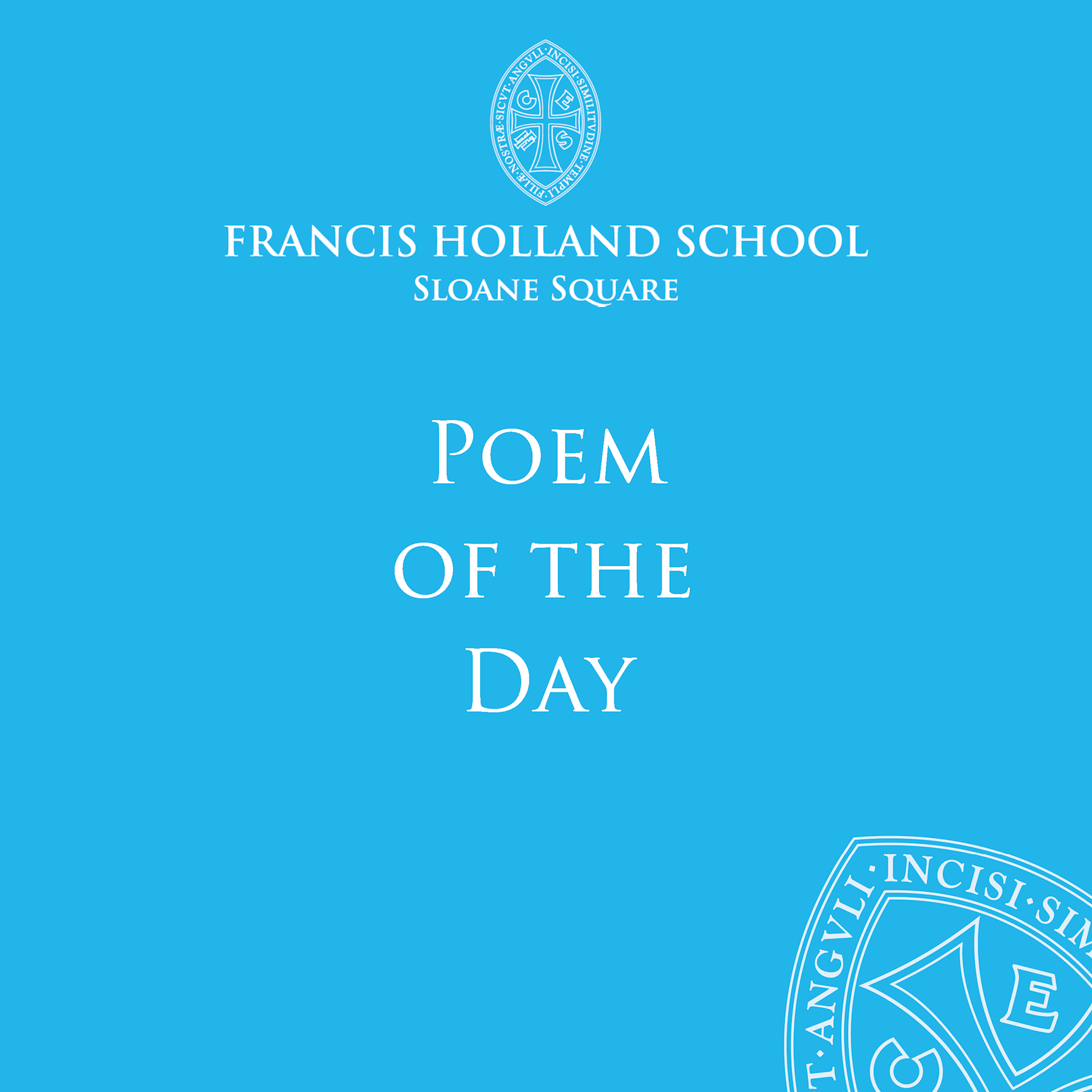Today’s poem has been chosen and introduced by Mr Macdonald-Brown.
“As we limp into the final week of this most peculiar term, the end is nigh too for FHS Poem of the Day. We started on the first day of term (with William Carlos Williams This is just to say), and weve given you a poem every day since. Todays is number 50; then there are just three more to go. Massive thanks to everyone whos contributed such wonderful poems and introductions: together we have served a feast! And what a feast it has been: so many languages of origin, from Latin, Chinese and Kannada to French, German and Dutch; so many themes: from the old chestnuts of love and nature (and cats) to te searingly topical matter of racial justice; and in a plethora of poetic forms: weve had a fridge note, a (Sapphic) fragment, fib poems, an epigram, haikus, sonnets Shakespearean and Petrarchan, performance poetry, dub poetry and rock lyrics.
Yet amidst the infinite variety, some odd gaps. What, no Welsh poets? None of the English Romantics? And nothing from my favourite poet, Philip Larkin? (Sorry, Phil.) Well, to make up for the shocking neglect of the Romantics at least, heres a sonnet from John Keats (17951821).
Aptly enough, its a celebration of reading and reading poetry in particular. The way Keats tells it, his first encounter via George Chapmans English translation with the epic poetry of Homer (author of The Iliad and The Odyssey) was quite the epiphany: no less spectacular than Wordsworth had with his host of golden daffodils. The first eight lines (the octave) is all build-up, with Keats explaining how hed travelld (i.e. read) widely around the western islands of poetry, but despite hearing great things about deep-browd Homer, hed never got round to reading his stuff until now In the 9th line (traditionally a sonnets volta a shift of tone or topic), the poem takes flight with Keats reaction: Then felt I like some watcher in the skies / When a new planet swims into his ken A GCSE examiner might approve of Keats sensitive and engaged personal response to a text (examiners are not poets), but as well its a kind of challenge to all readers: if were not getting this kind of hit the joy of an astronomer discovering a new planet from reading poetry, then why not? Read better poems! Read better!
Along with the infectious enthusiasm, theres some swagger here too: Keats isnt just paying homage to the mighty Homer, hes implicitly staking his own claim as a poet through penning this sonnet, of course (which, given its theme, needs to be pretty awesome and is), but also through his comparison of himself, after the astronomer simile, to stout Cortez the first European to cross South America and discover the Pacific Ocean (actually he wasnt, but never let the facts get in the way of a good poem). Hernán Cortés was an iconic explorer and adventurer, a 16th century Spanish conquistador; but, of course, his mission in the New World was as much about conquest as it was about discovery. Cortésbrutally overthrew the Aztecs and planted Spains flag. I like to think that, with this sonnet, his first great poem, Keats is planting a kind of flag in Homers kingdom and saying, with all the cheek of youth and genius, ‘Im the king here now.'”
On first looking into Chapmans Homer
Much have I travell’d in the realms of gold,
And many goodly states and kingdoms seen;
Round many western islands have I been
Which bards in fealty to Apollo hold.
Oft on one wide expanse had I been told
That deep-brow’d Homer ruled as his demesne;
Yet did I never breathe its pure serene
Till I heard Chapman speak out loud and bold:
Then felt I like some watcher of the skies
When a new planet swims into his ken;
Or like stout Cortez when with eagle eyes
He star’d at the Pacific – and all his men
Look’d at each other with a wild surmise –
Silent, upon a peak in Darien.














